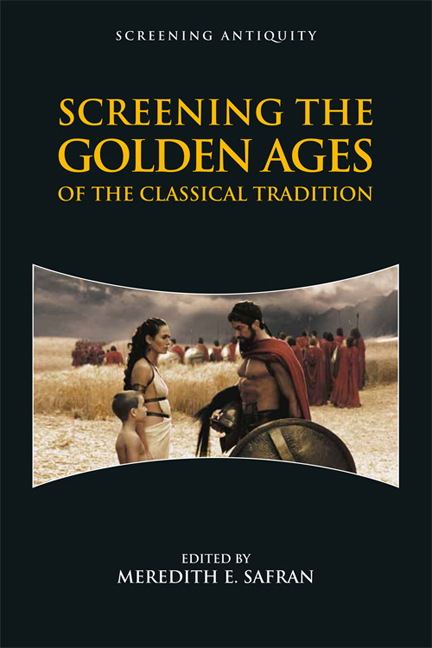Book contents
- Frontmatter
- Contents
- Series Editors’ Preface
- Editor's Acknowledgments
- Contributors
- Illustrations
- Abbreviations
- Introduction: Searching for Gold in an Age of Iron
- PART I THE GLORY THAT WAS GREECE
- 1 Re-(en)gendering Heroism: Reflective Nostalgia for Peplum's Golden Age of Heroes in Hercules: The Legendary Journeys 2.14 (1996)
- 2 Kissed by the Muse of Roller-Disco: Utopia versus the Golden Ages of America, Hollywood, and Classical Myth in Xanadu (1980)
- 3 Gilding American History through Song Culture in O Brother, Where Art Thou? (2000)
- 4 A Leonidas for the Golden Age of Superhero Films: The Thermopylae Tradition in 300 (2006)
- 5 The Dueling Greek Golden Ages of 300: Rise of an Empire (2014)
- 6 Confronting the Ancient Greek Golden Age in Jules Dassin's Phaedra (1962)
- 7 Pericles, Cincinnatus, and Zombies: Classicizing Nostalgia in The Walking Dead (2010–)
- PART II THE GRANDEUR THAT WAS ROME
- Filmography
- Bibliography
- Index
7 - Pericles, Cincinnatus, and Zombies: Classicizing Nostalgia in The Walking Dead (2010–)
from PART I - THE GLORY THAT WAS GREECE
Published online by Cambridge University Press: 23 November 2019
- Frontmatter
- Contents
- Series Editors’ Preface
- Editor's Acknowledgments
- Contributors
- Illustrations
- Abbreviations
- Introduction: Searching for Gold in an Age of Iron
- PART I THE GLORY THAT WAS GREECE
- 1 Re-(en)gendering Heroism: Reflective Nostalgia for Peplum's Golden Age of Heroes in Hercules: The Legendary Journeys 2.14 (1996)
- 2 Kissed by the Muse of Roller-Disco: Utopia versus the Golden Ages of America, Hollywood, and Classical Myth in Xanadu (1980)
- 3 Gilding American History through Song Culture in O Brother, Where Art Thou? (2000)
- 4 A Leonidas for the Golden Age of Superhero Films: The Thermopylae Tradition in 300 (2006)
- 5 The Dueling Greek Golden Ages of 300: Rise of an Empire (2014)
- 6 Confronting the Ancient Greek Golden Age in Jules Dassin's Phaedra (1962)
- 7 Pericles, Cincinnatus, and Zombies: Classicizing Nostalgia in The Walking Dead (2010–)
- PART II THE GRANDEUR THAT WAS ROME
- Filmography
- Bibliography
- Index
Summary
When the fourth season of AMC's The Walking Dead premiered on October 13, 2013, faithful viewers of the series recognized a shift in tone that accompanied a change in the pattern used for season openers. Previous seasons had begun with the group of survivors search-ing for shelter and battling walkers, and major characters met with disaster. Episode 2.1 (“What Lies Ahead”) had depicted the group on the road after fleeing the short-lived protection of the Center for Disease Control in Atlanta, Georgia; one major character's daughter disappears during a walker attack and another's son is shot accidentally. After losing yet another home, Hershel Greene's farm, Episode 3.1 (“Seed”) begins with the group fighting off walkers at the prison they hoped to use for shelter; Hershel (Scott Wilson) is bitten and his leg amputated in order to save him. In stark contrast, no major character is harmed in Episode 4.1 (“30 Days Without an Accident”); the only skirmish with walkers occurs when a small group is out on a run for supplies, and the lone casualty is a brand-new character. Instead, much of the episode is devoted to bucolic images of life in the prison that the group has now made its home.
This change seems to promise an end to the survivors’ struggles during the zombie apocalypse through the establishment of civil society within a walled agricultural community: a recovery of life in golden-age conditions. The term “golden age” can be applied not only to primordial times, but also to past utopian civilizations that are a product of human cultural invention, such as Periclean Athens or Republican Rome. Those “golden” times, however, tend to be the idealizing products of a troubled present, their utopian character shadowed with knowledge of their eventual end. Season 4 of The Walking Dead provides an opportunity to examine that nostalgia for an idealized past through the lens of dystopia brought about by the zombie apocalypse.
In this case, the threat to the community comes not only from outside but also from within, as the first five episodes of Season 4 trace the catastrophe-within-a-catastrophe of a flu outbreak.
- Type
- Chapter
- Information
- Screening the Golden Ages of the Classical Tradition , pp. 137 - 154Publisher: Edinburgh University PressPrint publication year: 2018



